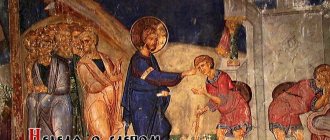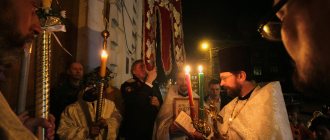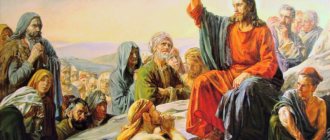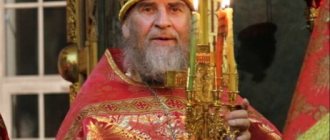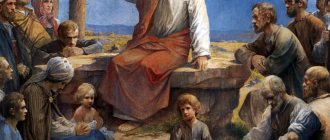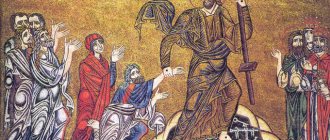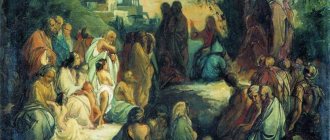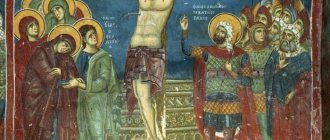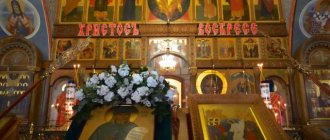Who is the Samaritan woman
The main character of the Gospel story, which is remembered on the fourth Sunday after Easter, is a woman, a resident of Samaria. Her name, according to legend, was Photinia. Translated, this word means “bright”, hence the identical female name – Svetlana. She became famous for the fact that, having believed in Christ, she led many people, her fellow countrymen, to him. The Gospel says that after her words, many went to see Him. Christ stayed at their request in the city for two days, the result of which was a large number of those who believed in Him.
Photinia ended her earthly life with a martyr's crown. According to legend, she was burned alive because of her faith. The church received a canonized saint, whom Svetlana can consider her patroness.
Orthodox news from around the world - BlagNews
In the week about the Samaritan. In the name of the Father, and the Son, and the Holy Spirit! Christ is Risen! Dear fathers, brothers and sisters! On today's Sunday, the Holy Church offers us a story about the conversation of Jesus Christ with the Samaritan woman (John 4: 5-42). Numerous gospel stories read during worship teach us the truths of the Christian faith. Each of us in our daily lives tries to find answers to the problems that arise before us. A believer strives to do all his deeds and actions according to the truth of God. Let’s delve deeper into the meaning of today’s Gospel read. Having learned that John the Baptist was thrown into prison by Herod, the Lord and his disciples left the borders of Judea and went to Galilee. After going a long way, they came to the Samaria city of Sychar. Tired of the journey, Jesus Christ sat down at a well to rest while His disciples went into the city to buy bread. At this time, a woman approached the well to draw water. The Lord turned to her with the words: “Give me a drink.” The woman was extremely surprised by these words, for she was a Samaritan, and Jews do not communicate with Samaritans. Having expressed her surprise, she heard in response: “If you knew the gift of God and Who says to you: “Give me a drink,” then you yourself would ask Him, and He would give you living water.” The woman was even more surprised by the man’s words and therefore said to him: “This well is deep, but you have nothing to draw from, where can you give me living water?” The Savior called His Divine teaching living water. Because, just as a few sips of fresh spring water save a tired traveler in the desert from death, so His teaching saves the soul of every person from death and leads to eternal life. The Samaritan woman did not understand the Savior’s words about living water and therefore said: “Sir, give me this water so that I don’t feel thirsty and don’t have to come every day to draw.” She thought about ordinary water, which she comes for every day, but the Savior told her: “Every person who drinks this fresh water will feel thirsty again. And the water that I will give him, this water will become in him a source of living water flowing into eternal life.” Now the Samaritan woman knows about living water and strives to accept it, but she does not yet understand that her sinful life prevents her from accepting God’s Grace. The Lord gently leads her to confession of sin. “Go, call your husband and come here for living water.” And she, knowing her life, meekly answers: “I don’t have a husband.” Thus, a sharp turn took place in the soul of the Samaritan woman from her previous vicious life. Two virtues were combined in her: awareness of her guilt and humility. It is said that God resists the proud, but gives Grace to the humble. (1 Pet.5.5). The woman, seeing that the one speaking to her saw her whole life and knew all her sins, began to understand that he was not speaking to an ordinary person and thought that he was a prophet. She heard from the people around her numerous conversations and disputes about the coming of the Messiah to the world. And she told him: “I know that when the Messiah comes, he will explain everything to us.” Christos answered her: “The Messiah is I.” Then the woman left the jug, went back to the city and said to the people: “Go and talk to the Man who told me everything about my life! Isn’t He the expected Messiah?” Many of the Samaritans came to the well, talked with Him and believed in Him. They asked Him to stay with them, and He stayed there for two days, talking with them about the mysteries of the Kingdom of God. Then they said: “We ourselves learn from conversations with him that He is the true Savior of the world, Christ.” Every believer strives to live in unity with God; for him this is an urgent necessity. There is no man without sin. Even believers sin daily, but each of them knows that sin deprives him of Divine help. However, a person’s soul strives for God, and therefore he again and again resorts to Him with repentance, so as not to deprive himself of His Grace. If illnesses of body and soul do not protect us from temptations, sorrows and earthly temptations, let us find strength within ourselves and call on Christ for help. Beloved fathers, brothers and sisters in the Lord! On this Sunday, when the Gospel account of the Lord’s meeting with the Samaritan woman is read, each of us should think about our own meeting with the Lord, here in the temple - at the well of living water. And we believe that He is in this house of God, looking at us, extending His Divine grace and help to those who love Him. The Lord Jesus Christ gave us an example of the highest love and humility. And we need to love the Lord and value every day as an opportunity to do good and saving things that are necessary for eternity. Amen. Archpriest Evgeny Zhemchugin Rector of the Elias Church. Mamontovo
Source of information: bogorodsk-blago.ru/news/3786/
Gospel story
In the fourth chapter of the Gospel, Saint John the Theologian describes a scene that is not found in the other evangelists. It tells how Christ and his disciples walked from Judea to Galilee. The road lay through Samaria. The local people were at first believers in the One God, but after that they also created idols for themselves. The simultaneous worship of God and idols was not approved by the Jews, so they did not allow them to build the Jerusalem Temple. Then the Samaritans built their temple on Mount Gerizim. From then on, the Jews treated the Samaritans poorly and tried not to communicate with them.
The Gospel story describes how Christ sat down near the city of Shechem (which the evangelist for some reason calls “Sychar”) and waited while the disciples went into the city to buy food. It was very hot that day. He sat down near the well that Jacob had given to his children many years ago.
At that moment, a woman from Samaria came and began to draw water from the well. Christ was thirsty and asked her for water . The Samaritan woman was surprised to recognize him as a Jew by his appearance or accent. She reminded Him that the people of Judea did not talk to the Samaritans. To which He replied that if she knew who was in front of her, she herself would have asked Him for living water. Christ meant Divine grace, but the Samaritan woman did not understand and asked where He got the well. At the same time, she joked, saying, is He really greater than Jacob, who gave them this well?
Christ, not paying attention to her unkind remarks, replied that the water that He could give her was unusual . After it you will not feel thirsty (meaning spiritual thirst). But the woman again did not understand, and, thinking that in front of her was a sorcerer, she asked for this magical water, which would make her no longer want to drink and would no longer need to come to this well for water.
Christ told her to bring her husband here, feeling that things were moving towards preaching the faith. The Samaritan woman did not want to open her personal life and lied that she did not have a husband. The Savior objected that she had been married five times, and was now secretly living with a man who was not her husband. Then the woman was very surprised and called the Interlocutor a “prophet.”
She immediately had a pressing question for Him: where should one worship God - the Jerusalem Temple or on Mount Gerizim? She wanted to know who was right, the Jews or the Samaritans, in exercising faith. But Christ answered that God is Spirit, and one must bow to Him not in a certain place, but in the soul.
To this the Samaritan woman thoughtfully replied that when Christ comes, he will explain everything to them. After which He, no longer hiding it, said that it was He . Then the disciples came, but did not inquire why He was talking to the woman. She, throwing her jug, ran into the city, where she told everyone that she had met Christ. The people went to see Him, and many then believed that day. They told the woman that it was not because of her words that they believed, but because they themselves saw Him.
Sermon on the 5th Sunday after Easter, about the Samaritan
Dear brothers and sisters! The fifth Sunday after Easter has already arrived. All Sundays are dedicated to gospel events, which give us, modern Christians, an invaluable lesson in gospel truth.
Today we heard the Gospel reading about the Samaritan woman - the woman who met Christ at Jacob's well. Jacob is the son of Isaac, the grandson of Abraham, who bequeathed this land and this well to his children, as well as to all the Jews.
Christ met a Samaritan woman at a well located near the Samaritan city of Shechem, on the way to Jerusalem, where He was heading for the Passover holiday. A dialogue began between Christ and the Samaritan woman, which, at first glance, may seem quite simple, but from the point of view of the gospel truth, this is a very important conversation. We see that a seemingly ordinary meeting takes place, during which Christ asks the woman to drink water. The Samaritan woman was surprised and answered: “How can you, being a Jew, ask me, a Samaritan woman, for a drink? For Jews do not communicate with Samaritans” (John 4:9). Jesus answered her: “If you knew the gift of God and Who says to you: Give Me a drink, then you yourself would have asked Him, and He would have given you living water.” (John 4:10). Christ’s answer indicates that the Lord did not just want to drink water from the well, but He Himself was ready to give “living water” to this woman, thereby revealing to her knowledge about the true God.
The words of Christ addressed to the Samaritan woman mean a lot to us. After all, very often, turning to the Lord in the temple, we thirst for simple and accessible water. People ask for this water, meaning the material benefits of this world: convenience, comfort, benefits, so that everything will be fine for us and for our neighbors. The Lord says that we need to ask God for another gift - “living water”, which will become in our heart the source of eternal life. We must ask God for grace, strength and intelligence to obtain a heavenly inheritance and eternal life.
We see that each new question and answer of Christ leads the Samaritan woman more and more to the idea that before her is not an ordinary person, but the Messiah Himself. This happens after Christ exposes the woman, revealing the secrets of her heart: “For you have had five husbands, and the one you now have is not your husband” (John 4:18). The woman immediately understands everything and goes to the city to invite her brothers to meet the Messiah. The Gospel testifies that Christ remained two more days in Samaria to preach there. We see that the inhabitants of this city believe in Christ not at all because of the Samaritan woman’s story about Him, but because they themselves saw the Creator and His truth before them.
We also see, brothers and sisters, how after the conversation with the Samaritan woman the Lord met with his disciples. When asked by the apostles to take food, Christ replies: “I have food that you do not know” (John 4:32). The Lord refused the meal and said that His food lies elsewhere, pointing to His disciples at the people: “But I say to you, lift up your eyes and look at the fields, how they are white and ripe for harvest” (John 4:35) Christ says that His food is to do the will of His Father. “My food is to do the will of Him who sent Me and to finish His work.” (John 4:36)
And indeed, dear brothers and sisters, these are very profound words. They apply not only to the Lord Himself and His disciples, but also to all people. True food is the fulfillment of God's will: the desire to live according to the commandments lasts as a Divine gift with your loved ones. Then we become true apostles and preachers. The Teaching of Christ must change a person, change the way he thinks and feels.
Jacob's well has survived in the city of Shechem to this day. Only today this city is mainly inhabited by Muslims. Few Christians live there. For many centuries, this well was a place of pilgrimage for Orthodox Christians. Unfortunately, today the temple, next to which Jacob's well is located, is located in a hostile society.
I had the opportunity to visit the Holy Land and pray there. It turns out that at the end of the 20th century a new martyr appeared at this place - the priest Felumen. He was Greek by birth and lived in the temple located near Jacob's well. At that time, many Muslims living in this city were not happy with such a neighborhood. They threatened the priest, insisted that he leave his place of service and remove icons and crosses from the church. Despite numerous threats, the priest did not betray his faith. He categorically rejected such proposals. In 1979, a group of radical Muslims broke into the temple, carried out a pogrom there and brutally tortured this priest. Father Felumen was hacked to death with an ax and his eyes were gouged out. The temple was desecrated. The throne has been destroyed. Fifteen years later, the priest was canonized as a new martyr.
It is impossible to convey the feelings that you experience while being in this holy place! When, as it is said in the Gospel, you lower it into this well, about thirty meters deep. When you drink this wonderful and tasty water from this well and realize that here, at this well, more than two thousand years ago Christ talked with the Samaritan woman. This water was also discussed in the Gospel. And nearby, in the temple, there is an icon and the relics of a martyr who gave his life for God’s truth, who was not afraid and did not want to part with that very “living water” to which Christ testified.
Also, Christians who come to worship in this holy temple, looking at the well and remembering the holy martyr, probably think that in the life of every person there should be “living water,” that truth that one should never be afraid to confess.
+Bishop of Pokrovsky and Nikolaevsky Pachomius,
Holy Trinity Cathedral in Pokrovsk,
May 10, 2015
May 12, 2015
leave a comment
Share to:
Where to bow to God
The main idea of this passage is that God does not expect from us visible worship of Him, but ardent spiritual faith, correction of life and aspiration of the spirit towards Him. When asked by the Samaritan woman where to bow, i.e. who is right, Jews or Samaritans, Christ tried to end this long dispute, thereby reconciling these peoples who have common roots. Thus, making it clear how unreasonable are disputes or even quarrels, military actions arising due to misunderstandings in faith, differences in religious views.
God does not need our bodily bows, much less quarrels over faith, He needs an open, warm heart of a person!
Sermon by Patriarch Kirill on the 5th week of Easter, about the Samaritan
Russian Orthodox Church
On May 17, 2022, on the 5th Sunday after Easter, O Samaritan, His Holiness Patriarch Kirill of Moscow and All Rus' celebrated the Divine Liturgy in the Church of the Holy Blessed Prince Alexander Nevsky in the monastery of the same name near Peredelkino. At the end of the Liturgy, the Primate of the Russian Church delivered a sermon.
In the name of the Father and the Son and the Holy Spirit!
Today is Easter Sunday, on which we remember the conversation of Christ the Savior with the Samaritan woman (John 4:5-42). It is known that the Samaritans, like the Jews, were a Semitic tribe that lived in the center of Palestine. It happens that good relations do not develop between neighbors or relatives; So between the two tribes - the Jewish and the Samaritans - there was constant enmity, which was not only of an everyday nature, but also had a certain religious dimension.
This is exactly what today’s Gospel reading is about. We heard how the Lord, being in Samaria, was at Jacob's well. This ancient well actually dates back to the time of the forefather Jacob, son of Isaac, grandson of Abraham, and it was revered by the Samaritans as a great shrine. At this well, from which the Samaritans drew water, Christ met a woman, and according to the custom of that time, there should be no verbal contact between them, because the Jews did not communicate with the Samaritans. But the Lord unexpectedly asks the Samaritan woman for water: give me something to drink. She says to Him: Don’t You know that we do not communicate? But the Lord, despite this, continues the conversation, and then she asks Him about something that was most important for the Samaritans, because this is what separated them from the Jews. And she began to ask because the Savior, without knowing her, told her everything about her life - that she had several husbands, and that the man with whom she now lives is not her husband at all. The Samaritan woman ran to her village and began to call the people, saying: Is this not the One for whom we are waiting? Isn't He the Messiah? After all, He said everything that related to my life, although He could not know this...
Shocked by the revelation from the Savior, the Samaritan woman turned to Him the most important question: why do you worship in Jerusalem, and we worship on this mountain? For the Samaritans did not go to Jerusalem to worship, but worshiped God on Mount Gerizim, not far from the very center of Samaria, and made sacrifices on this mountain. It was the question of the place of worship of God that separated the Samaritans from the Jews religiously, and the Samaritan woman wanted to know where, after all, He should be worshiped - in Jerusalem or on this mountain. But the Lord answers her not at all what she expected to hear. He says that the time will soon come, and has already come, when people will worship God not in Jerusalem or on the mountain, but in spirit and truth. These words of the Savior refer to the entire history that began after His coming into the world. Now for a Christian it makes no difference from the point of view of salvation where God should be worshiped, for the most important thing is to worship Him in spirit and in truth.
What do the words spirit and truth mean? Truth means true faith, and true faith presupposes certain knowledge. We know how throughout history people fought for the true faith, because they understood: if the truth does not take possession of the human mind, then something most important is hidden from a person, which alone is capable of determining his life path.
Truth really refers to what happens in the human person at the level of cognition. Therefore, it is no coincidence that throughout Christian history the Church has fought so hard to ensure that the truth, the revealed truth, transmitted by the Lord Himself to the apostles, and through the apostles to the entire Church, is preserved intact. From the history of the Church we know what terrible battles took place around the truth, how often heresies arose, that is, deliberate distortions of the truth. And in order to destroy many human intricacies, during the first millennium Ecumenical Councils met, issues of faith were discussed, and the very truth that the Lord handed over to his apostles was defended. But it does not cease to defend itself in the second millennium, as it will probably continue to defend itself in the future, and the struggle around the truth will continue until the very end of the human race.
But doesn’t everything that we experience today on the intellectual level, doesn’t the rational challenges that are thrown at the Church and Christian beliefs require us to fight, don’t they require us to defend the truth? The more a person acquires knowledge, the more rational arguments he has that are used to question Divine truth. And this happens not because knowledge is incompatible with faith, but because a person, armed with knowledge, gives his personality a meaning that in many ways exceeds the true meaning of a person. We know that man, relying on his knowledge, began to put himself in the place of God, and for the first time this happened not in the 21st or 20th century, but in antiquity, when reason became so self-sufficient in human life that it displaced God to the periphery life. But if we talk about today, then this is how it happens today - with even greater force, because, having mastered scientific knowledge, many believe that this knowledge reveals to them the ultimate truth.
But this is not at all true, because the ultimate truth lies outside rational knowledge. The ultimate truth is where God is, and God cannot be known by reason alone. He is known in spirit and truth. Truth, of course, refers to the mind, but the spirit is something completely different. This is the action of Divine grace, and if grace does not touch a person’s heart, then it is impossible to approach God with any reason. If there is no Divine grace, then the mind will further and further separate man from God, which is what is happening today. Very many, becoming educated people, instead of turning both their hearts and minds to God, move away more and more from Him.
God is known in spirit and truth. This is a testament to all of us. This means that for us rational truth is not something unnecessary or secondary. Indeed, we are all called to develop our minds, to receive an education if possible, and to direct all the powers of our minds, including to understanding the Divine mysteries. But we will never be given this understanding if we do not grow in spirit. And the spirit is our inner life. The spirit is what will go into eternity along with our soul. And if our mind, acting according to the physiological laws laid down by God in human nature, has a limited existence time, then the soul and spirit, in which the rational principle will also be present, pass into eternity.
Let today's Gospel reading help us understand that spirit and truth are what should be present in the life of every person. You cannot seek truth while ignoring the spirit, and perhaps you cannot strive to possess the spiritual while ignoring the truth. That is why the Lord said: the time will come and has already come when true worshipers will worship the Father in spirit and truth. And it is so important today, in our special time, filled with the greatest scientific discoveries, that all the powers of the mind be supported by the power of the spirit. Probably, we need to think about this right now, when, despite colossal human knowledge, the human race has unexpectedly plunged into a pandemic of a terrible disease. This is truly a challenge to our modern knowledge. Of course, scientists will discover ways to combat this disease, but at some point we should think about why we do not already have the ability today to immediately stop this pandemic, relying on the power of reason. The Lord allows us these trials so that we can think about our limitations. Not everything is given to us, and not everything is given at once, and, bowing before the face of God, we must ask Him for help not only in improving our mind, but also in constantly elevating our spirit and so that the spirit fertilizes our mind . Then there will be no contradictions between science and religion, between the external world that surrounds us and the spiritual world in which the Church lives.
The human race must strive for this synthesis of the spiritual and the material, the rational and the spiritually sublime. And perhaps the turmoil we are going through now will help us realize that the greatest truth lies in the strength of the human spirit. And may the Lord help us in this! Amen.
Press service of the Patriarch of Moscow and All Rus'
Christ is Risen! Happy Sunday to all of you, brothers and sisters. Today's Sunday, the Week, is called the Week of the Samaritan Woman, since we heard with you the Gospel opening, which tells about the conversation of our Savior with the Samaritan woman (John, 12 ch., IV, 5-42).
We all know what the Lord talked about with this woman. One day, after getting tired and sitting down near a well, He met a woman who came to draw water. And when it turned out that Christ could give water to this woman, she did not understand where He could get it from. And to the question: “Where can You get this water, since You don’t have any?” (John 4:7) - the Lord answered her in such a way that it became clear to her that the Messiah was in front of her. It became clear to her that before her was the One who was greater than the patriarch Jacob.
And she, this woman, asked the Lord perhaps the most important question that a person of that time could ask. She asked Him: “Where should we worship God in order to truly worship Him?” And to this Christ replied: “The time is coming, and has already come, when true worshipers will worship God in spirit and truth” (John 4: 19-23).
Perhaps these are the most important words of today's Gospel. In a certain sense, these are the most important words of our entire life, because depending on how - correctly or incorrectly - a person worships God, his entire salvation depends. But, if one believer asks another: “What must be done, how must God be worshiped, in order to truly worship Him, that is, to be saved?”, and the other answers this question: “Worship God in spirit and truth,” then it is unlikely the questioner's answer will be satisfactory. And there are interpreters who say that Christ’s answer is very complex, because it is really not easy to understand what it means to “worship God in spirit and truth.” Therefore, many interpreters focus our attention on the correct understanding of these words.
Of course, if we say that there is spirit and truth in man himself, then we must worship them. But what is the spirit in us and what is the truth in us? Saint John Chrysostom, explaining this passage, says that here the Lord calls to worship God with a pure mind and a pure heart. Perhaps, indeed, if a person cleanses his mind, makes it pure, then the mind will begin to reflect the truth that is approved in the universe by the Creator himself. If a person cleanses his heart, then it will become a pure spirit, because nothing carnal, nothing bad, nothing sinful will touch him. Thus, St. John Chrysostom gives us an answer, a definite answer to the question of what it means to “worship God in spirit and truth.” After all, if we affirm that this can only be done in a pure mind and in a pure heart, then it means that Christ’s answer calls us exclusively to one thing: to cleanse the mind and heart, that is, to repentance.
Of course, the Church cannot tell us anything else, because this is the only and exclusively correct path that a person should follow.
Christ once said to his disciples: “Yes, truly I say to you, if you continue in My words, you will understand the truth. And the truth will set you free, and you will become My disciples” (see: John 8: 31-32). In these words we also find a very important statement: that sin takes a person captive solely due to the fact that a person has an incorrect concept of life. He does not have the truth in himself, and therefore sins. But as soon as a person who begins to work for the Lord
who tries to fulfill His holy commandments, that is, according to the word of Christ himself, to abide in His word, he begins to understand the truth, and the truth frees him from committing sin. And then a person begins to do nothing other than worship God in truth.
But, on the other hand, Holy Scripture also tells us about another truth. The Lord Jesus Christ Himself testified of Himself: “I am the way, and the truth, and the life” (see: John 14:6). That is, the truth is Christ Himself. And the spirit that the Lord has in mind in today’s Gospel is perhaps the Spirit of Truth. These, one might say, are two inseparable Personalities. There is also a Father. Father, Son and Spirit, as we say.
Truth and the Spirit will always testify about the True God, about the Father. This means that anyone who worships God and wants to truly worship cannot do this without Christ and without the Spirit of Truth.
What does it mean? After all, also telling a person: “Worship God through Christ and through the Spirit of Truth” will not be a satisfactory answer to a person: how to do this. And the answer to this question, in essence, will be the entire teaching about the Church, because the Church is a divine-human organism, which has Christ as its head and is animated by God the Holy Spirit. And this means that in today’s statement we find another very important point: that one can truly worship God, that is, be saved, only in the Church of Christ. There is no salvation outside the Church, so the ancients said and so the new Holy Fathers repeated.
Therefore, today’s Gospel conception, one might say, as if set in stone, places a person on two immutable foundations: without repentance, which is accomplished in the Church of Christ, there can be no salvation for a person. And today’s gospel conception, in fact, is evidence of this.
A woman comes to Christ who lived with five husbands, who were not her husbands, as Christ says, and the one with whom she lives now is not her husband at all (see: John 4: 16-20). We don’t know who this woman is in her role in life. But it is surprising that Christ enters into communication with her, thereby testifying that He came into the world, indeed, to save sinners. There is no one whom He would leave with His love, warmth, care and truth.
And after His words: “Go and bring your husband” (see: John 4:16) - in order to give him this living water, divine grace - everything in the woman suddenly turns upside down. She, one might say, repents of her entire life, corrects herself, is transformed, and immediately asks a question that would hardly come to the mind of a man or woman who lived with five husbands and the sixth is not her husband at all: “Where should we worship, because our fathers teach this way, and you teach this way?” (see: John 4:20).
And she goes to the village, and in the village she says that she has met the true Messiah. And despite the fact that, of course, everyone in this village knows her, they trust her, trust her, accept her words. Why? Because her face was transformed, because it shone after meeting Christ. And indeed, it is impossible, having met the Lord, heart to heart, mind to mind, to not be transformed.
This is the salvation that this woman testified to each of us in today’s Gospel. And then the people who came to the Lord, with whom He communicated for two days - imagine! - who were practically pagans, and the Jews did not communicate with them precisely because of this, in two days they understood the truth so much that, turning to Jesus, they said: “Now we know for ourselves, no longer needing the words of this woman, that You are truly the Savior of the world, Christ!” (cf. John 4:42).
This is what staying in the words of the Lord accomplishes, following His holy commandments, correcting one’s life on these immutable principles.
May the Lord grant each of us the opportunity to listen carefully to His holy words, not to neglect the simplicity of these words, no matter how simple it may seem to us at first glance; listen to what the holy interpreters teach us about these words - those who, indeed, were able to truly worship God in spirit, that is, to be saved. Then we too will begin to understand this truth, then we will become truly disciples of Christ. The truth will free us from any sin, make us free. And then we will glorify the Lord with gratitude for giving us the great gift of repentance, carried out in His Holy Church.
Amen.
Church of the Life-Giving Trinity at Pyatnitskoye Cemetery,
18.05.2014
05/18/2014. Homily for the Fifth Sunday after Easter, about the Samaritan .
Audio: Adobe Flash Player (version 9 or higher) is required to play this audio.
Download the latest version here. In addition, JavaScript must be enabled in your browser. Last modified date: 02/26/2016
A week about the Samaritan woman
Saint Tikhon of Zadonsk calls us to extract from all life events not only memories that torment us or enlighten us with joy, but also deep meaning. He calls us to treat all events of life, to every person, like a bee that collects honey from all plants. And therefore, although the meeting of the Savior Christ with the Samaritan woman is a real event, although in Samaria there really was a woman who was given the opportunity to meet the Savior face to face, to hear His voice, to see His image, although this woman is real to the end, and their conversation is to the end the end is real, because it contained eternal salvation for her, an understanding of what she had never understood before, and for all the inhabitants of the city, according to her testimony, the beginning of a completely new life; Despite all this, I now want to use some of the Savior’s words as one of the ancient Fathers of the Church uses them.
“Call your husband,” says Christ... “I have no husband.” And the Savior answers: yes, it’s true: you lived with five husbands, but not one was your husband...
This church writer says: is this really similar to how the human soul lives, as it were, in a marriage union, in the closest union, with our sensuality; as if the soul lives in us and knows only what it sees, what it hears, what it can feel with its hands, what it can taste with our five senses. And with none of these feelings or with the totality of these feelings can she become so close as to grow to the full measure of her dignity, because through them she touches only the surface, only the visible, and can never, never touch the depth. Our soul, as many of our prayers say, has only one groom - the Living God, with whom it can enter into an inextricable, eternal union of love and worship, and in this union see the depth of the event, the meaning of life, understand the deep meaning of everything that the Lord has created .
And now each of us is in the same position as this Samaritan woman; we live by feelings. We see and respond to what strikes our gaze. We hear - and respond to what touches our hearing. We partake of all life, as if touching it, communicating with it on its very surface. And at the same time we are called to go into those depths of God, where we will be in communion with the Living God...
In this meeting of the Samaritan woman with Christ, a wondrous miracle happened: she met the Living God, and everything else became alien to her; for her to continue to live only by what she lived, and by whom she lived, became, as it were, fornication, although before that it was her very life. And this she proclaimed to all the inhabitants, and this they heard from her, and this they learned from their meeting with Christ.
To know things in their depth does not mean not to see their external beauty, harmony, wondrous structure that the Lord gave them, but it means not to be deceived by the brilliance, not to be deceived by the glow that objects give, that people give, that communication with people gives, forgetting those depths of belonging to each person and kinship with the whole world that we find in Christ.
Therefore, let us enter into this depth, let us turn to Christ, let us enter into this indestructible union with Him, and only through His eyes, only through His experience, through the divine experience of creation, will we communicate with the world. And then we will see the world in imperishable beauty, in such beauty, with such meaning, with such depth that feelings cannot give us. Amen!
Triodion colored
5th Sunday after Easter - (John 9:1-38) - May 11, 1980
I would like to draw your attention to two features in today's Gospel reading. The first is that again and again the Lord Jesus Christ performs a miracle on the Sabbath day, causing the indignation of those who kept the law with all its severity and kept it with fanaticism.
But Christ does not do this in order to offend them; God created the world in six days, and on the seventh day He rested from His labors, entrusting the world to the care of man. All history, from the creation of the world to the Second Coming, is the day of man, when man must bear the fruits of creation, must bring creation to its fullness, and reunite creation with its Creator.
Man betrayed his calling: we were called to bring the world to the perfection of beauty and harmony with God and with ourselves, but we made it ugly and monstrous. But Christ came, the only true Man, the only Man in complete harmony with God, the only Man who was capable of fulfilling the task that was entrusted to man. And when He works His miracles on the Sabbath day, this is a call for us to treat History, our day, the day in which we live, as a day that God has entrusted to our care, and make it the Lord's Day.
And another feature that is in direct connection with the first: when we read in the Gospel about the actions of God, His preaching, His miracles, we rush to Him with the hope that He will perform a miracle for us. And we forget that Christ said that He gave us an example that we must follow: what He did, we must do, and that indeed, according to His own word, whoever believes in Him will do greater works than miracles, which He created...
Our calling is to transform the world, to transform it at its very roots, but not at all to constantly be the object of Divine care. We, Christians, have bled Christianity, made it powerless and weak, by treating History not as the day of man, when we must create, but as the time when God supposedly must constantly pour out His grace, and His help, and His mercy. He, on the evening of His resurrection, called us to go into the world as He came, to go into the world as messengers of love, messengers of God Himself, and to fulfill this mission of ours, as He fulfilled it - at the cost of our lives, pouring out our life so that others lived, giving, if necessary, their death so that others could come to life.
We are very far from our calling; we run to God for help at the very moment when He commands us to break through, to go, to be His presence in the world. The Apostle Paul knew this when he said that “I complete in my body, that is, in my whole being, soul and flesh, what is lacking in the passion of Christ”...
And Christ calls us to forget ourselves, to turn away from ourselves, because we ourselves are a stumbling block that prevents us from fulfilling our calling: fear for our body, fear of moral, mental suffering, fear of all those things that we are called to fulfill. We fear death, although we proclaim that Christ has conquered death; where is our faith? We grieve when someone dies, although we know that there is no more death, that there is only a temporary dormition, while the living soul rejoices face to face with its Living Lord...
We must learn to distance ourselves when fear, greed, or whatever it is that focuses us on ourselves prevents us from fulfilling what we are called to: to be messengers of God's love, God's compassion, God's truth. Here we must say to ourselves: Get away from me, Satan, adversary, enemy of God, because you are not thinking about the things of God...
If we are truly Christians, we should repeat, following the Revelation of John, the words of the Spirit and the words of the Church: Yes, come, Lord Jesus, and come soon!.. But we, many of us, do not yearn, do not long for this coming , knowing that His coming means the death of all things on earth and our awakening face to face with God.
We are sent into the world to be what Christ was, and the only reason we are not this is because we did not refuse, did not deny ourselves in order to fulfill our mission. The blind man met Christ face to face; Christ healed him. How many people are blind around us - not by physical blindness, but by a more terrible blindness: blindness to the meaning of life, blindness to love, blindness to compassion, blindness to everything that could turn life into a battlefield and into victory...
We must go out as Christ walked, forgetting himself, taking up his cross, following Him, for He said that if we want to come anywhere, then we must follow Him. This is a challenge to us; what happened in the days of Christ's bodily life must happen now that we are the incarnate Body of Christ. And if we are unable to do this, then we must ask ourselves direct and tough questions and answer them mercilessly, without self-pity, and become the kind of Christians we should be, what we are called to be: Christians in whom people could recognize Christ Himself . Amen.
